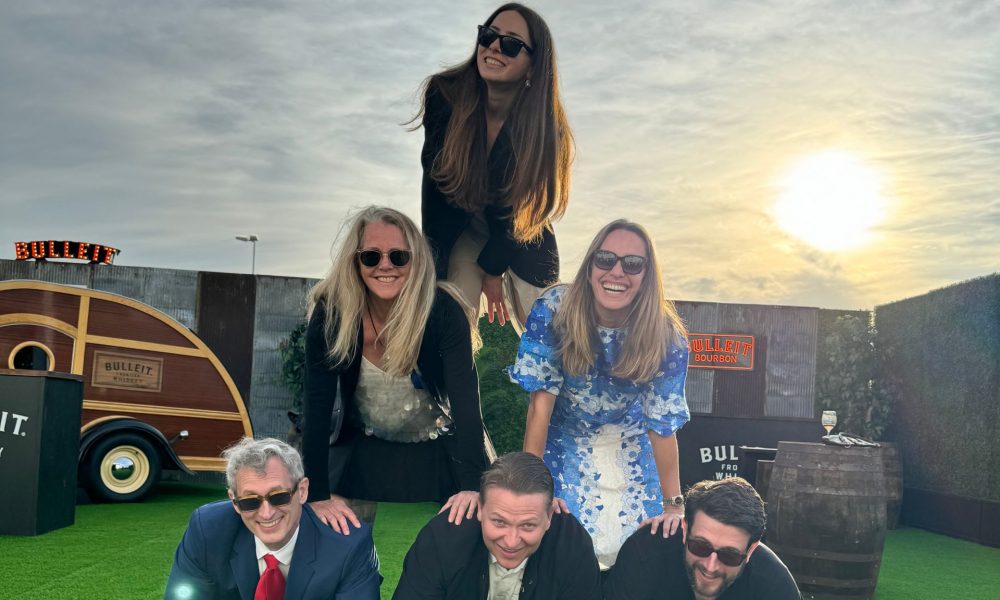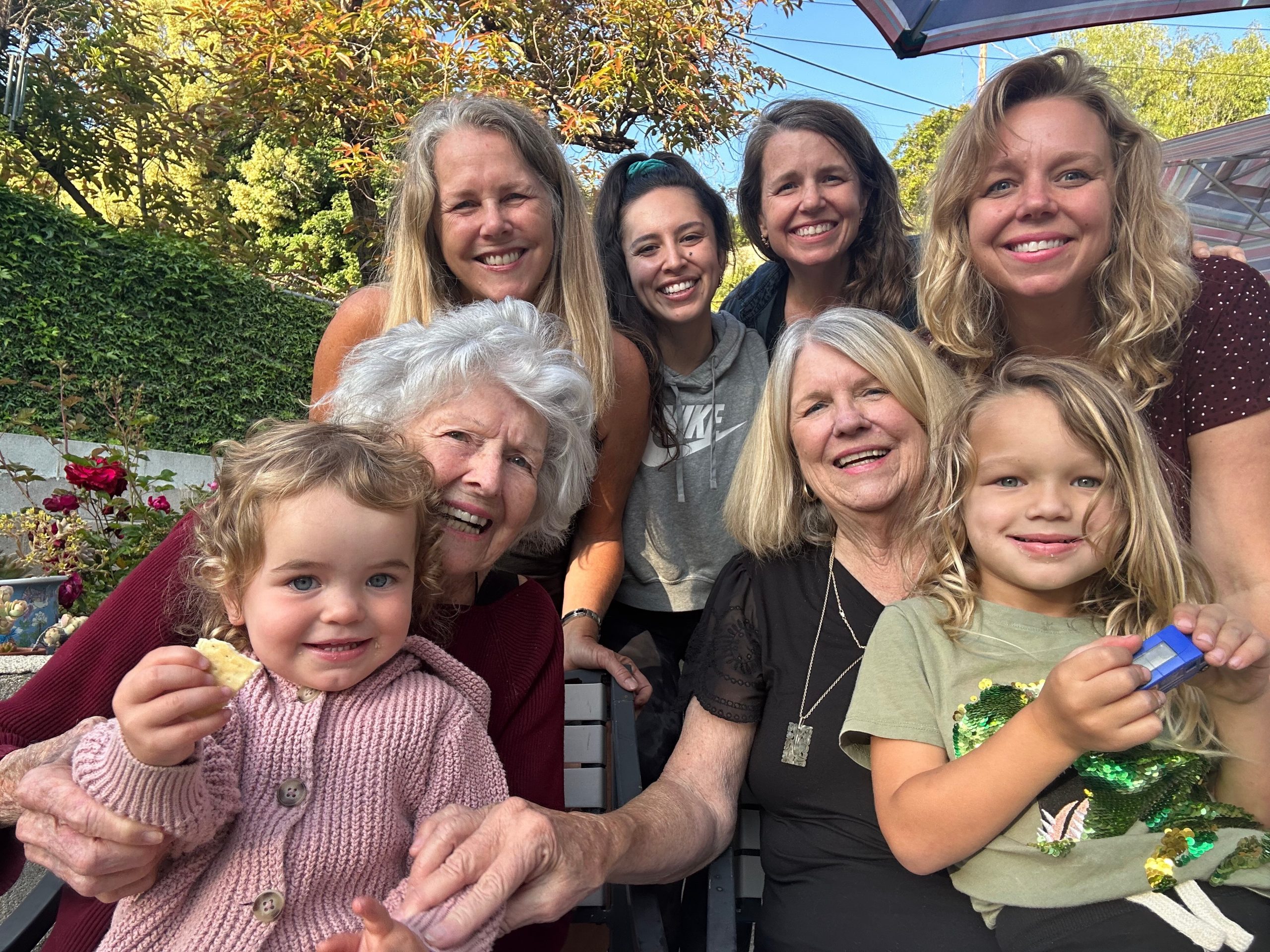

Today we’d like to introduce you to Robina Riccitiello.
Hi Robina, please kick things off for us with an introduction to yourself and your story.
I grew up in Eagle Rock and went to UCLA, where I met a bunch of brilliant people and worked on the college paper, the Daily Bruin. That prepared me to work in journalism. My first job was at KTTV, where I was literally a messenger, racing to City Hall to pick up a videotape and running it back to the station in Hollywood. That job was like LA News 101, teaching me who to ask and how to ask questions as a journalist and building a bulging Rolodex. I went on to work in the “cop shop,” covering crime and fires from the ground floor press room at police headquarters, working crazy hours, listening to police scanners and doing “beat checks,” calling every police and sheriff station to find the news. I covered the criminal courts, everything from Night Stalker hearings to Sean Penn’s assault case. Later, I covered City Hall with a dedicated group of fellow journalists based in the City Hall press room, sometimes filing five or six stories a day for UPI. I got used to writing fast (and it had to be accurate) and churning out a lot of copy on deadline. Sometimes, I’d have to dictate a story over the phone to my editors. (This was long before laptops and cell phones. You took notes in a skinny wire-bound reporter’s notebook. And recorded interviews on a tape recorder with a tiny cassette tape in it.) My job at UPI was unpredictable. One time, I arrived at work, and they said, “You’re going to the Oscars!” The Herald Examiner reporter and I sneaked backstage to get the good interviews with Cher and other luminaries. After living in Italy for a Rotary Scholarship and New York and London for my partner’s work, I got a job with Space News in Paris, covering the European space industry, with a focus on the Italian Space Agency. I had to do long interviews in Italian and cover press conferences in French in Paris, finding that American reporters were used to being much pushier with public officials than European ones. Later, as I was raising my two daughters, I worked as a freelance reporter for Newsweek, covering the Scott Peterson trial, among other assignments, and Crain’s Chicago Business. I’ve covered stories all over the world and interviewed everyone from Bill Clinton when he was running for president to crime victims and astronauts. But the experience that equipped me to do that work happened in Los Angeles – in the newsrooms at the Daily Bruin, KTTV, City News Service and UPI. A lot of my confidence and persistence comes, in particular, from my first boss in a professional newsroom, the dedicated, volatile, unforgettable Debra Fasciano. (Maybe you should feature her instead of me. She was my assignment editor at KTTV and went on to work as a writer in TV and then as a UPS driver (actually in reverse order) and now I think she is a teacher in the South Bay.) It has been quite a few years since I’ve worked regularly as a journalist. Now I work as a film producer, helping (usually) young filmmakers get their first or second films made: documentaries like The Infiltrators, The Social Dilemma, A Still Small Voice, Against the Tide, Aftershock, Black Box Diaries, Porcelain War, New Wave and feature films including Didi, Soft and Quiet, We Grown Now, The Queen of My Dreams, Bitterroot, Mutt, A Love Song.
In late 2023, my business partner Josh Peters and I started Spark Features with the goal of helping young filmmakers bring their vision to the world. We try to bring stories to the screen that are different, quirky, surprising, challenging. Our ideal writer-director is a young person who doesn’t have all the connections to get their brilliant work made. A perfect example is a recent call with had with a really smart young writer-director who was proposing a short film. When we asked why not skip the short and make a full-length film, the guy said, “I never thought anyone would fund it.” We want to be those producers – who are ready to believe in smart people who have worked for years to make their films, who have the skills and imagination and just need a team to help make it happen. Spark Features had four films at Sundance this year, including Didi, which won the Audience Award and the Acting Ensemble award. And Porcelain War, which won the grand jury prize for best documentary. (Separately, I also had Sugarcane, which won the documentary directing award at Sundance.)
Josh and I aim to make Spark Features a different kind of film company that’s a lot about friendships and support. We attended the Independent Spirit Awards in February because a film I supported, We Grown Now, was nominated for three awards. Around our table, we had four filmmakers who shot films in 2023 with Spark Feature’s help. We laughed and toasted and introduced each other to people we wanted to meet. At the end, we got together and built a human pyramid with the director of Idiotka, a film shot last year, on top.
At SXSW, Spark Features had five films, and we continued to establish ourselves as a different kind of film company. One of our airbnb roommates was the producer of Mutt and The Queen of My Dreams. The reason I invested in The Queen of My Dreams, a gorgeous Canadian film with Bollywood twists, is because that same producer, Alexander Stegmaier, stayed with me in San Francisco when Mutt came to the Frameline film festival. The personal friendships that developed with the Mutt team when my niece Heather Box and I went to the Berlin Film Festival in February 2023 turned into professional bonds that continue to flourish. Another example of that is this: at SXSW, Josh and I organized a very last-minute happy hour with something like 30 minutes notice. We promised a margarita and a back rub to whoever showed up. Sure enough, we had our filmmakers from Black Box Diaries, Grand Theft Hamlet, The Bear, and Promises of Our Grandmothers show up and their growing friendships will lead to exciting collaborations, whether we are involved or not. Our company is all about those relationships. Yes, we want to make money, but we also want to propel these filmmakers into unforgettable experiences that will create unforgettable moments on screen.
Today, We Grown Now is playing in Los Angeles and New York. Late Bloomers, a film I helped produce before Spark Features began, opens in June in New York. Didi will open in theaters in July. Frybread Face and Me, Soft and Quiet, A Love Song, Mutt, Riotsville USA, The Social Dilemma and so many other films are streaming. And Spark Features has three or four more films ready to shoot this year. (L.A. connection-wise, at least two of the films are from LA-based filmmakers. Last year, one of our films was shot in LA, and many of our films have some connection to LA, whether producers or filmmakers. Also – Josh lives in LA with his family.)
On a personal note, while all these amazing, exciting moments were happening in 2024, the year has been tinged with deep sadness as my 100-year-old Mom, who was born in LA and spent 90 years of her life there, slowed down and died last month. And my first nephew, Jason Luther, who was born in LA and last visited last June for a Dodger game, died at 53 from the effects of a brain tumor diagnosed two and a half years earlier.
Last December I had a moment that I will never be able to replicate. I was staying with my 99-year-old Mom at the time in Eagle Rock, her hometown since 1946. Two filmmakers from “Against the Tide,” a beautiful documentary about two indigenous Koli fishermen in India, were coming into town to promote the film in the long-shot Oscar campaign, going up against films that had millions of dollars for Oscar promotion. So, I picked up the director, Sarvnik Kaur, and producer, Samudrika Arora, at LAX, and before we headed back to Eagle Rock, we stopped by Josh’s house and when no one answered, we just walked in and surprised Josh and his wife, Marisa, who were both busy on Zoom calls. (I don’t know that many people well enough to just walk in their house, but Josh and I have created that kind of comfort with each other that it felt OK to do.) We sat in Josh’s backyard, with a view of the planes taking off from LAX and talked with Sarvnik and Sam about their hopes and dreams for the film. After a stop at Olvera Street for lunch, we went to Eagle Rock, where they showered my mom with gifts from India, and then on to a screening of Against the Tide at Vidiots, a theater in Eagle Rock that has become a nexus for Oscar qualifying films. Getting to know our filmmakers and building friendships is a key part of our ethos at Spark Features, and I think it plays a big part in our success, too.
Would you say it’s been a smooth road, and if not, what are some of the biggest challenges you’ve faced along the way?
Oh, where to start? As a white woman from a healthy, supportive family, I have had many fewer obstacles that many other people in this world. Honestly, the love and support of my family have made me feel like I can stick with something that may not work out longer than other people might.
As an example, after a couple of years at KTTV, where I went on to work as a news assistant, field producer, and sometimes assignment editor, I decided I didn’t want to work in TV news. I couldn’t just leave my job, as I had bills to pay: both my rent in an old Pasadena house that I shared with my best friend, cousin, and two others, and my car payment for my cool Volkswagen Jetta were about $160/month. (I know! Can you imagine!) So, I got a second job, working 6 am to 2 pm on the weekends at City News Service. I worked the early shift at KTTV, too, so, for many months, I worked 6 am to 2 pm, seven days a week. At first, I was responsible and would be sure to go to bed by 9 or 10. As time went on, I’d join my friends for late-night shows or a drink at the Fire Fly or the Frolic Inn, sure that I could still get up by 5 am. Soon, I was hired by City News Service and began working in the press room at the Criminal Courts building, covering the Twilight Zone involuntary manslaughter trial of director John Landis daily for more than a year.
There are others if you need more.
As you know, we’re big fans of you and your work. For our readers who might not be as familiar what can you tell them about what you do?
As a reporter, I was an employee of a news organization, and I spent my days attending court hearings or listening to police scanners and making phone calls attending city council or other hearings or protests or news conferences, and quickly writing up a story.
As a film producer, I meet often with filmmakers who want to get funding for their work, give feedback on scripts and story ideas, brainstorm ways of getting films made, connect filmmakers and other producers with potential funders, encourage young aspiring filmmakers and authors.
If you had to, what characteristic of yours would you give the most credit to?
My parents always taught us to look for the best in people and to assume the best intentions in someone’s actions. While those traits aren’t always appropriate for a news reporter, I think having an open approach to hearing the facts of a story helped me tell it with fewer biases. I think it made me more likable than some other reporters, which helped me when people would reach out with leads or trust me with information they were worried about sharing. In the film world, I think listening and caring (OH – and HAVING FUN) are traits that help me succeed. I try to avoid boring, typical conversations about the weather and the usual and dive into something deeper. My work with my niece Heather Box, who founded the Million Person Project, helps with that. Heather teaches artists activists, and others to tell their most personal story to explain why they do their work and how to connect with audiences.
So, I have spent some of the most vulnerable, deep moments of my life talking to people I don’t know well about their child’s mental health issues or their sister’s death, or their worries about their job. Listening to people and making them feel like I care about them is a superpower. And then having fun part makes a difference, too. Did I mention we did a human pyramid at the premiere of Didi at SXSW, too? And at my mom’s 100th birthday party? It all started at the Mutt afterparty at the Berlin film fest. It was a fun party, but at about 2 am, it was flagging, so my niece Heather and I began to recruit people to build a human pyramid. By 3:30, we had collected enough willing, if dubious, people and built a pyramid.
Another valuable skill that I have is believing that hard problems can be solved – or at least affected by my work. An example of that is the work I’m doing with my business partner Josh’s wife, Marisa Peters, and my friend Dave Thau. Together, we are working like crazy for a six-month period to publicize the dramatic increase in early-onset colon and rectal cancer. Both Marisa and Dave experienced colorectal cancer in their 30s and survived after a grueling set of treatments. We decided to do everything we could to get Dave and Marisa interviewed on every TV and radio station that would accept them, talk to newspaper reporters and podcast producers, write op-eds and social media posts. Our goal is to educate people and, as a symbol of that, to get people to take the pledge to check their colorectal health by taking the pledge at www.beseen.care, a website created by Marisa to encourage people to advocate for their own health to teach about early-onset colorectal cancer. Already, Marisa has been featured in a New York Times article and published an article in Ms. magazine and both Marisa and Dave have been featured in a dozen or more TV interviews and podcasts. (Marisa is another LA resident who would be an amazing subject for you.)
Contact Info:
- Website: https://www.sparkfeatures.com www.beseen.care
- Instagram: @heyrobina @sparkfeatures @beseen
- Facebook: Spark Features
- Linkedin: Robina Riccitiello
- Twitter: @spark_features















